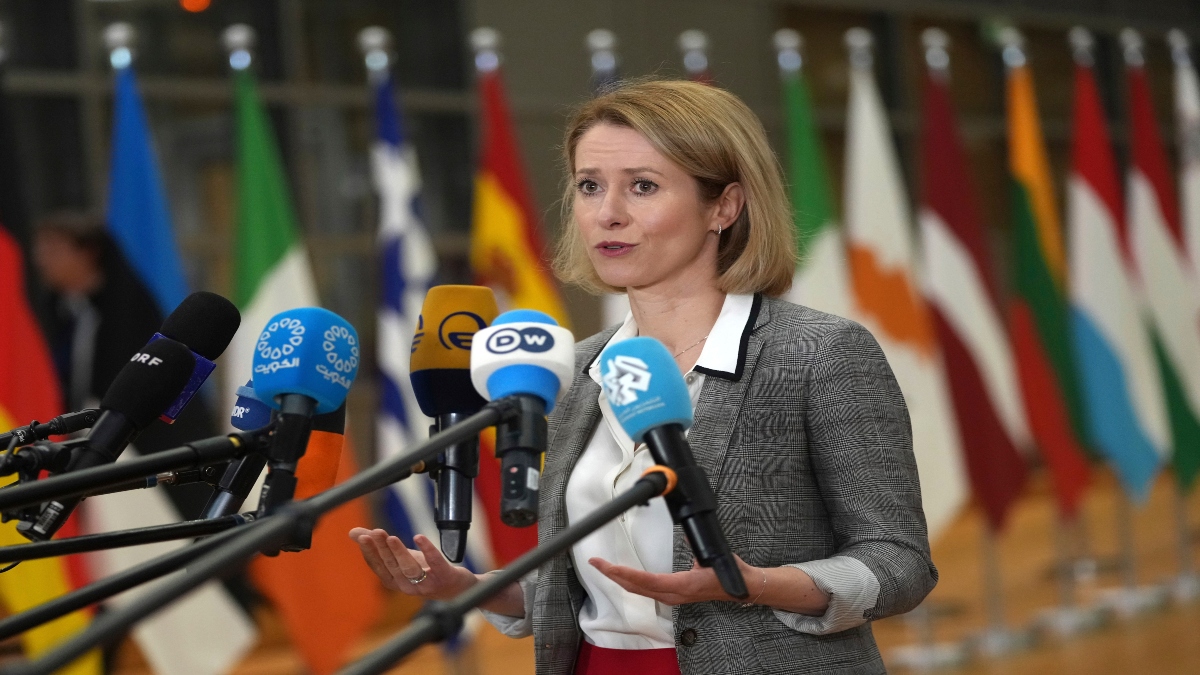The European Union is asking for updates and more action from Israel on the implementation of a new accord to transport humanitarian supplies to Gaza, the bloc’s foreign policy leader, Kaja Kallas, said Tuesday.
Foreign ministers from the EU’s 27 member countries were gathering in Brussels following the agreement mostly negotiated by Kallas and Israeli Foreign Minister Gideon Saar. Saar met with EU leaders on Monday after agreeing last week to let badly needed food and fuel into the coastal enclave of 2.3 million people who have lived through more than 21 months of war.
Kallas said, “The border crossings have been opened, we see more trucks going in, we see also operations of the electricity network, but it’s clearly not enough because the situation is still untenable.”
The specifics of the agreement are unknown, but EU authorities have refused any collaboration with the Israeli-backed Gaza Humanitarian Fund due to ethical and safety concerns. The objective is to open additional border crossings and enable more assistance vehicles into Gaza, although authorities say they hope to ultimately establish a monitoring post at the Kerem Shalom gate.
Calls to reassess ties with Israel
In the aftermath of the conflict, European states such as Ireland, the Netherlands, and Spain have increasingly advocated for a rethinking of the EU’s relationship with Israel.
Impact Shorts
More ShortsA European Commission assessment found “indications” that Israel’s actions in Gaza violate human rights commitments under the agreement governing its relations with the EU, but the union is divided on how to respond.
The new humanitarian arrangement was made possible by public pressure on Israel’s actions in Gaza, according to Dutch Foreign Minister Caspar Veldkamp, who added, “That force of the 27 EU member states is what I want to maintain now.”
Kallas will provide EU member countries with a report every two weeks on how much help is really reaching needy Gazans, Irish Foreign Minister Thomas Byrne said.
“So far we haven’t really seen the implementation of it, maybe some very small actions, but there’s still slaughter going on, there’s still a denial of access to food and water as well,” he said. “We need to see action.”
Spanish Foreign Minister José Manual Albares Bueno said details of the deal were still being discussed and the EU would monitor results to see if Israel is complying.
“It’s very clear that this agreement is not the end — we have to stop the war,” he said.
There have been regular protests across the continent, including a small one on Tuesday outside the European Council, where the ministers were discussing the aid plan.
Dozens of protesters in Brussels called for more aggressive actions to stop Israel’s military campaign in Gaza.
“It was able to do this for Russia,” said Alexis Deswaef, vice president of the International Federation for Human Rights. “It must now agree on a package of sanctions for Israel to end the genocide and for humanitarian aid to enter Gaza.”
Human rights groups largely called the EU’s actions insufficient.
“This is more than political cowardice,” said Agnès Callamard, secretary general of Amnesty International. “Every time the EU fails to act, the risk of complicity in Israel’s actions grows. This sends an extremely dangerous message to perpetrators of atrocity crimes that they will not only go unpunished but be rewarded.”
Risks to humanitarian groups
The war in Gaza began when Hamas-led militants attacked southern Israel on Oct. 7, 2023, killing around 1,200 people and taking 251 others hostage, most of whom have been released in earlier ceasefires. Israel responded with an offensive that has killed more than 58,000 Palestinians, more than half of them women and children, according to Gaza’s Health Ministry.
The ministry, which is under Gaza’s Hamas-run government, doesn’t differentiate between civilians and combatants. The U.N. and other international organizations see its figures as the most reliable statistics on war casualties.
The EU has observed some aid trucks entering Gaza, but “not enough,” said Hajda Lahbib, an EU commissioner for equality, preparedness and crisis management.
“The situation is still so dangerous, so violent, with strikes still continuing on the ground, that our humanitarian partners cannot operate. So, this is the reality — we need to have a ceasefire,” she said.
)